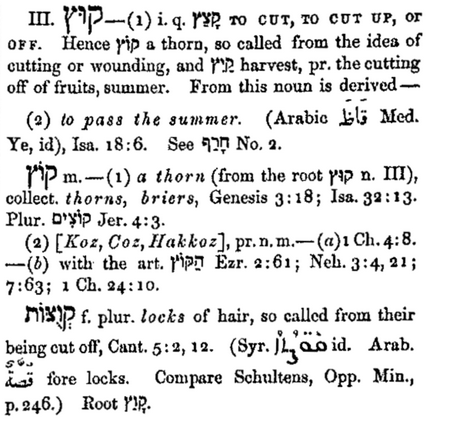 Song of Solomon 5:2
Song of Solomon 5:2

| לילה | רסיסי | קוצות י | טל | נמלא | ש ראש י | תמת י | יונת י | רעית י | אחת י | ל י | פתחי | דופק | דוד י | קול ׀ | ער | ו לב י | ישנה | אני |
| her night | drops | my thorns | dew | he was filled up | which is my head | my perfect one/I have finished | my dove | my companion | my sister | to myself | open! | he who knocks | beloved of myself | voice | awake | and the heart of myself | she has slept | myself |
9016 | None Definition: verseEnd Root: None Exhaustive: None 3915 ליל layil Definition: properly, a twist (away of the light), i.e. night; figuratively, adversity Root: or (Isaiah 21:11) ליל; also לילה; from the same as H3883 (לול); Exhaustive: or (Isaiah 21:11) ליל; also לילה; from the same as לול; properly, a twist (away of the light), i.e. night; figuratively, adversity; (mid-)night (season). | 7447a רסיס râçîyç Definition: properly, dripping to pieces, i.e. a ruin; also a dew-drop Root: from H7450 (רסס); Exhaustive: from רסס; properly, dripping to pieces, i.e. a ruin; also a dew-drop; breach, drop. | 9020 | י None Definition: my, personal posessive - noun suffix: 1st person common singular Root: None Exhaustive: Personal posessive pronoun - suffix for nouns, adjectives and passive participles: 1st person singular 6977 קוצה qᵉvutstsâh Definition: a forelock (as shorn) Root: feminine passive participle of H6972 (קוץ) in its original sense; Exhaustive: feminine passive participle of קוץ in its original sense; a forelock (as shorn); lock. | 2919 טל ṭal Definition: dew (as covering vegetation) Root: from H2926 (טלל); Exhaustive: from טלל; dew (as covering vegetation); dew. | 9014 | ־ None Definition: link Root: None Exhaustive: None 4390 מלא mâlêʼ Definition: to fill or (intransitively) be full of, in a wide application (literally and figuratively) Root: or מלא; (Esther 7:5), a primitive root; Exhaustive: or מלא; (Esther 7:5), a primitive root; to fill or (intransitively) be full of, in a wide application (literally and figuratively); accomplish, confirm, [phrase] consecrate, be at an end, be expired, be fenced, fill, fulfil, (be, become, [idiom] draw, give in, go) full(-ly, -ly set, tale), (over-) flow, fulness, furnish, gather (selves, together), presume, replenish, satisfy, set, space, take a (hand-) full, [phrase] have wholly. | 9020 | י None Definition: my, personal posessive - noun suffix: 1st person common singular Root: None Exhaustive: Personal posessive pronoun - suffix for nouns, adjectives and passive participles: 1st person singular 7218a | ראש rôʼsh Definition: the head (as most easily shaken), whether literal or figurative (in many applications, of place, time, rank, itc.) Root: from an unused root apparently meaning to shake; Exhaustive: from an unused root apparently meaning to shake; the head (as most easily shaken), whether literal or figurative (in many applications, of place, time, rank, itc.); band, beginning, captain, chapiter, chief(-est place, man, things), company, end, [idiom] every (man), excellent, first, forefront, (be-)head, height, (on) high(-est part, (priest)), [idiom] lead, [idiom] poor, principal, ruler, sum, top. 9007 ש None Definition: which Root: Derived terms של (shel) של־ (shel'-) Exhaustive: who, which. An abbreviation used as a prefix.אשר | 9020 | י None Definition: my, personal posessive - noun suffix: 1st person common singular Root: None Exhaustive: Personal posessive pronoun - suffix for nouns, adjectives and passive participles: 1st person singular 8535 תם tâm Definition: complete; usually (morally) pious; specifically, gentle, dear Root: from H8552 (תמם); Exhaustive: from תמם; complete; usually (morally) pious; specifically, gentle, dear; coupled together, perfect, plain, undefiled, upright. | 9020 | י None Definition: my, personal posessive - noun suffix: 1st person common singular Root: None Exhaustive: Personal posessive pronoun - suffix for nouns, adjectives and passive participles: 1st person singular 3123 יונה yôwnâh Definition: a dove (apparently from the warmth of their mating) Root: probably from the same as H3196 (יין); Exhaustive: probably from the same as יין; a dove (apparently from the warmth of their mating); dove, pigeon. | 9020 | י None Definition: my, personal posessive - noun suffix: 1st person common singular Root: None Exhaustive: Personal posessive pronoun - suffix for nouns, adjectives and passive participles: 1st person singular 7474 רעיה raʻyâh Definition: a female associate Root: feminine of H7453 (רע); Exhaustive: feminine of רע; a female associate; fellow, love. | 9020 | י None Definition: my, personal posessive - noun suffix: 1st person common singular Root: None Exhaustive: Personal posessive pronoun - suffix for nouns, adjectives and passive participles: 1st person singular 269 אחות ʼâchôwth Definition: a sister (used very widely (like brother), literally and figuratively) Root: irregular feminine of H251 (אח); Exhaustive: irregular feminine of אח; a sister (used very widely (like brother), literally and figuratively); (an-) other, sister, together. | 9030 | ני None Definition: me, personal pronoun - verb/prep. suffix: 1st person common singular Root: None Exhaustive: Personal object pronoun - suffix for propositions and verbs without an object: 1st person singular 9005 ל None Definition: to, for Root: None Exhaustive: None | 9014 | ־ None Definition: link Root: None Exhaustive: None 6605a פתח pâthach Definition: to open wide (literally or figuratively); specifically, to loosen, begin, plough, carve Root: a primitive root; Exhaustive: a primitive root; to open wide (literally or figuratively); specifically, to loosen, begin, plough, carve; appear, break forth, draw (out), let go free, (en-) grave(-n), loose (self), (be, be set) open(-ing), put off, ungird, unstop, have vent. | 1849 דפק dâphaq Definition: to knock; by analogy, to press severely Root: a primitive root; Exhaustive: a primitive root; to knock; by analogy, to press severely; beat, knock, overdrive. | 9020 | י None Definition: my, personal posessive - noun suffix: 1st person common singular Root: None Exhaustive: Personal posessive pronoun - suffix for nouns, adjectives and passive participles: 1st person singular 1730 דוד dôwd Definition: (figuratively) to love; by implication, a love-token, lover, friend; specifically an uncle Root: or (shortened) דד; from an unused root meaning properly, to boil, i.e. Exhaustive: or (shortened) דד; from an unused root meaning properly, to boil, i.e.; (figuratively) to love; by implication, a love-token, lover, friend; specifically an uncle; (well-) beloved, father's brother, love, uncle. | 9015 | ׀ None Definition: separate Root: None Exhaustive: None 6963a קול qôwl Definition: a voice or sound Root: or קל; from an unused root meaning to call aloud; Exhaustive: or קל; from an unused root meaning to call aloud; a voice or sound; [phrase] aloud, bleating, crackling, cry ([phrase] out), fame, lightness, lowing, noise, [phrase] hold peace, (pro-) claim, proclamation, [phrase] sing, sound, [phrase] spark, thunder(-ing), voice, [phrase] yell. | 5782 עור ʻûwr Definition: to wake (literally or figuratively) Root: a primitive root (rather identical with through the idea of opening the eyes); Exhaustive: a primitive root (rather identical with through the idea of opening the eyes); to wake (literally or figuratively); (a-) wake(-n, up), lift up (self), [idiom] master, raise (up), stir up (self). | 9020 | י None Definition: my, personal posessive - noun suffix: 1st person common singular Root: None Exhaustive: Personal posessive pronoun - suffix for nouns, adjectives and passive participles: 1st person singular 3820a | לב lêb Definition: the heart; also used (figuratively) very widely for the feelings, the will and even the intellect; likewise for the centre of anything Root: a form of H3824 (לבב); Exhaustive: a form of לבב; the heart; also used (figuratively) very widely for the feelings, the will and even the intellect; likewise for the centre of anything; [phrase] care for, comfortably, consent, [idiom] considered, courag(-eous), friend(-ly), ((broken-), (hard-), (merry-), (stiff-), (stout-), double) heart(-ed), [idiom] heed, [idiom] I, kindly, midst, mind(-ed), [idiom] regard(-ed), [idiom] themselves, [idiom] unawares, understanding, [idiom] well, willingly, wisdom. 9002 ו None Definition: and Root: None Exhaustive: Conjunctive vav - i.e. followed by prefix, suffix or non-verb (conjunctive) (‘and/but’) | 3463 ישן yâshên Definition: sleepy Root: from H3462 (ישן); Exhaustive: from ישן; sleepy; asleep, (one out of) sleep(-eth, -ing), slept. | 589 אני ʼănîy Definition: I Root: contracted from H595 (אנכי); Exhaustive: lemma אני second vowel, corrected to אני; contracted from אנכי; I; I, (as for) me, mine, myself, we, [idiom] which, [idiom] who. |
I stand at the door and knock
Myself, she has slept! And the heart of myself is awake! the voice of the beloved of myself is he who knocks! Open to myself, sister of myself, companion of myself, dove of myself! Perfect one of myself, who is the head of myself filled of the night-dew!1 The clipped locks2 of myself with the drops of night!
I slept and my heart waked: the voice of my beloved knocks at the door; Open to me, my sister, my friend, my dove, my perfect one: my head was filled with dew, my locks with the drops of the night.
I sleep, but my heart is awake. It is the sound of my Beloved that knocks, saying , Open to Me, My sister, My love, My dove, My undefiled. For My head is filled with dew, My locks with the drops of the night.
She I slept, but my heart was awake. A sound! My beloved is knocking. “Open to me, my sister, my love, my dove, my perfect one, for my head is wet with dew, my locks with the drops of the night.”
I sleep, but my heart is awake: The voice of my kinsman knocks at the door, saying, Open, open to me, my companion, my sister, My dove, my perfect one: For my head is filled with dew, And my locks with the drops of the night.
Footnotes
| Sng. 5:2 | Given the information from Gesenius' discussion on relative clauses, the term שראשי (sheroshi) can be reexamined in light of its syntactical and morphological components.
Putting it together:
The construction follows the pattern of relative clauses seen in Gesenius' analysis, where שֶׁ introduces a defining or explanatory relative clause that further specifies the head as belonging to the speaker. The syntactical structure is consistent with the usage of שֶׁ in more familiar, colloquial constructions, where the relative pronoun links a noun with additional description or clarification, even though אשר might appear in more formal texts. In this case, שֶׁ serves to connect the notion of "head" to a specific quality or possession, reinforcing its role as a relative pronoun that introduces a dependent clause modifying ראשי. |
| Sng. 5:2 | See #6795 קוֹץ in the feminine plural, from the root קוּץ which means clipped or shorn off (cf. Strong's #6972, Gesenius) |
